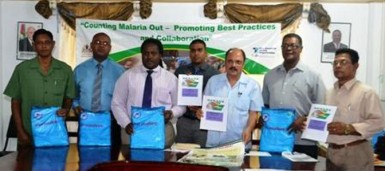The Guyana Gold and Diamond Miners Association (GGDMA) on Monday received 15,000 insecticide-treated bed nets as part of a ramped up Ministry of Health fight against malaria.
In the last few weeks a total of 37,000 treated nets have been handed over to various agencies by the ministry, according to the Government Information Agency. This is part of the ministry’s goal to distribute 50,000 nets this year to aid in the reduction of malaria and other vector-borne illnesses such as dengue. The project is being supported by the Global Fund and other entities. It costs about US$50 to purchase, store and distribute each net, a release from GINA said.

On Monday, the Ministry handed over a total of 27,100 nets to the (GGDMA) -15,000, Guyana Forestry Commission (GFC) – 5,000, Guyana Geology and Mines Commission (GGMC) – 5,000 and the Forest Products Association (FPA) – 2,000 and the Ministry of Public Works – 100.
The number of nets handed to the miners is a reflection of the seriousness of the disease in the mining areas. Miners travelling frequently in various stages of infection present a serious challenge to controlling malaria.
During last week, the Vector Control Services Department, which has oversight for the diagnosis and treatment of malaria and other vector-borne diseases, distributed 10,000 of the bed nets to senior officials of the Regions 7 and 8 Regional Democratic Councils (RDCs).
According to GINA, Minister of Health, Dr. Bheri Ramsaran explained that the recipient organisations will be signing a Memorandum of Understanding (MoU) with the Ministry as a measure of accountability.
In this regard, the receiving organisations signed a distributor agreement and another form will be signed by the beneficiary. This seeks to ensure that there are no duplications in the distribution process since some people may receive nets from other organisations.
Minister of Public Works, Robeson Benn who received the nets, expressed appreciation on behalf of the Ministry’s staff who work in malaria-prone areas.
He noted that the Ministry’s immediate interest is with respect to the hinterland road workers and contractors who are at present working on the Amaila Falls access road, and another road in the Pakaraimas Mountains in Regions 8 and 9 to be completed by the end of the year.
GINA said that Minister Ramsaran indicated that the partnership with the GGDMA was facilitated by the Ministry of Natural Resources and the Environment when the Association endeavoured to purchase large quantities of nets for its members. The Ministry will be acting as a technical partner to guide the organisation in the selection of the appropriate nets.
Another component of this partnership is the establishment of a malaria committee and others will be set up in hinterland areas where malaria is prevalent.
The Health Ministry makes available training opportunities for persons such as microscopists who conduct most of their duties in the field. According to GINA, Ramsaran disclosed that he has challenged the private sector to sponsor students in the programmes offered by the Ministry, particularly microscopy. There are currently 300 microscopists.
Ramsaran emphasised that the Ministry of Health is also providing educational materials along with the nets and will within a month, be hosting another colloquium on malaria.
GINA said that apart from the bed nets distribution, the Malaria Unit in 2013 will be undertaking several other initiatives such as carrying out mass blood and fever surveys every 21 days in all mining camps and villages, aiming at curing every confirmed malaria case based on standard treatment guidelines, and extending outreaches and mass health education and awareness programmes to poor and vulnerable groups.




